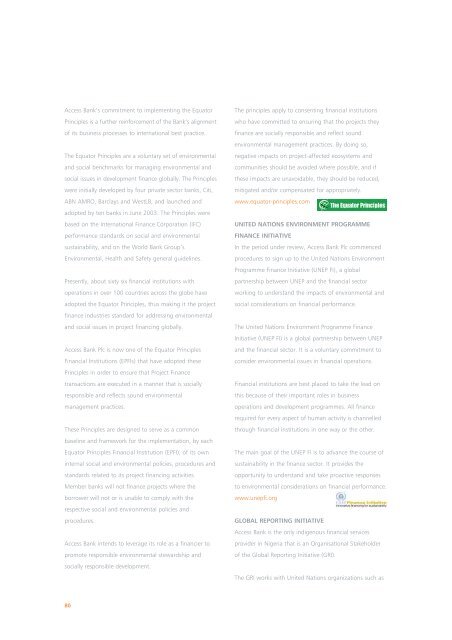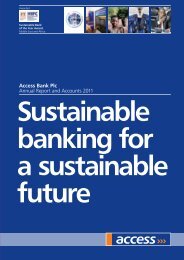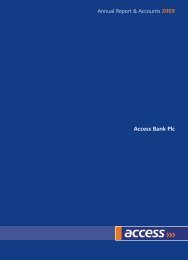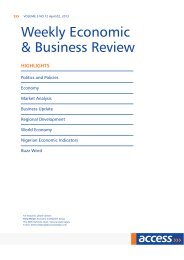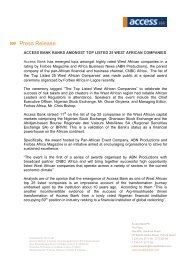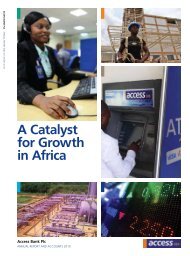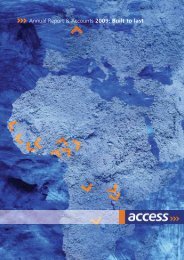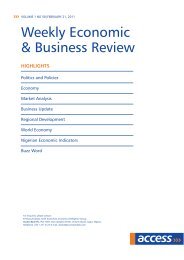Corporate Social Responsibility Report 2008 As ... - Access Bank
Corporate Social Responsibility Report 2008 As ... - Access Bank
Corporate Social Responsibility Report 2008 As ... - Access Bank
You also want an ePaper? Increase the reach of your titles
YUMPU automatically turns print PDFs into web optimized ePapers that Google loves.
<strong>Access</strong> <strong>Bank</strong>’s commitment to implementing the Equator<br />
Principles is a further reinforcement of the <strong>Bank</strong>’s alignment<br />
of its business processes to international best practice.<br />
The Equator Principles are a voluntary set of environmental<br />
and social benchmarks for managing environmental and<br />
social issues in development finance globally. The Principles<br />
were initially developed by four private sector banks, Citi,<br />
ABN AMRO, Barclays and WestLB, and launched and<br />
adopted by ten banks in June 2003. The Principles were<br />
based on the International Finance Corporation (IFC)<br />
performance standards on social and environmental<br />
sustainability, and on the World <strong>Bank</strong> Group’s<br />
Environmental, Health and Safety general guidelines.<br />
Presently, about sixty six financial institutions with<br />
operations in over 100 countries across the globe have<br />
adopted the Equator Principles, thus making it the project<br />
finance industries standard for addressing environmental<br />
and social issues in project financing globally.<br />
<strong>Access</strong> <strong>Bank</strong> Plc is now one of the Equator Principles<br />
Financial Institutions (EPFIs) that have adopted these<br />
Principles in order to ensure that Project Finance<br />
transactions are executed in a manner that is socially<br />
responsible and reflects sound environmental<br />
management practices.<br />
These Principles are designed to serve as a common<br />
baseline and framework for the implementation, by each<br />
Equator Principles Financial Institution (EPFI), of its own<br />
internal social and environmental policies, procedures and<br />
standards related to its project financing activities.<br />
Member banks will not finance projects where the<br />
borrower will not or is unable to comply with the<br />
respective social and environmental policies and<br />
procedures.<br />
<strong>Access</strong> <strong>Bank</strong> intends to leverage its role as a financier to<br />
promote responsible environmental stewardship and<br />
socially responsible development.<br />
The principles apply to consenting financial institutions<br />
who have committed to ensuring that the projects they<br />
finance are socially responsible and reflect sound<br />
environmental management practices. By doing so,<br />
negative impacts on project-affected ecosystems and<br />
communities should be avoided where possible, and if<br />
these impacts are unavoidable, they should be reduced,<br />
mitigated and/or compensated for appropriately.<br />
www.equator-principles.com<br />
UNITED NATIONS ENVIRONMENT PROGRAMME<br />
FINANCE INITIATIVE<br />
In the period under review, <strong>Access</strong> <strong>Bank</strong> Plc commenced<br />
procedures to sign up to the United Nations Environment<br />
Programme Finance Initiative (UNEP FI), a global<br />
partnership between UNEP and the financial sector<br />
working to understand the impacts of environmental and<br />
social considerations on financial performance.<br />
The United Nations Environment Programme Finance<br />
Initiative (UNEP FI) is a global partnership between UNEP<br />
and the financial sector. It is a voluntary commitment to<br />
consider environmental issues in financial operations.<br />
Financial institutions are best placed to take the lead on<br />
this because of their important roles in business<br />
operations and development programmes. All finance<br />
required for every aspect of human activity is channelled<br />
through financial institutions in one way or the other.<br />
The main goal of the UNEP FI is to advance the course of<br />
sustainability in the finance sector. It provides the<br />
opportunity to understand and take proactive responses<br />
to environmental considerations on financial performance.<br />
www.unepfi.org<br />
GLOBAL REPORTING INITIATIVE<br />
<strong>Access</strong> <strong>Bank</strong> is the only indigenous financial services<br />
provider in Nigeria that is an Organisational Stakeholder<br />
of the Global <strong>Report</strong>ing Initiative (GRI).<br />
The GRI works with United Nations organizations such as<br />
80


